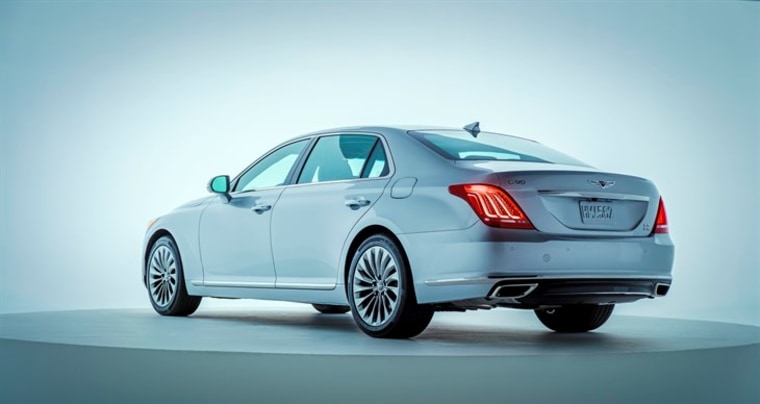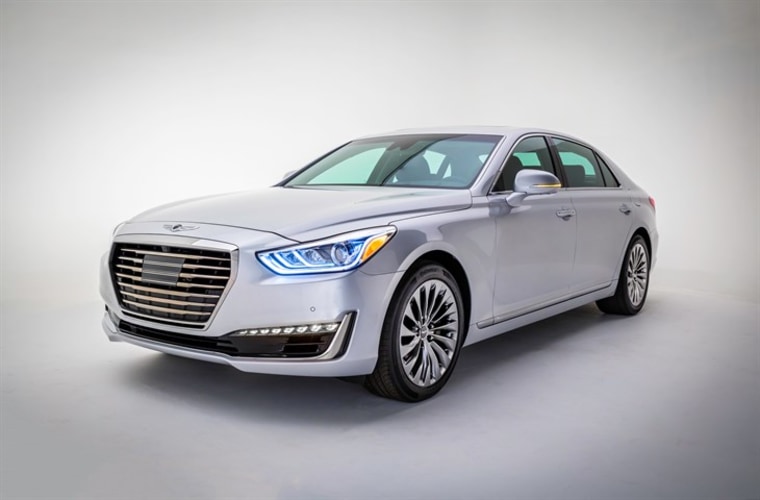In the beginning... there was a small brand from South Korea that made some of the cheapest, and smallest, cars on the road. And American motorists found they were good.
At the current pace, Hyundai Motor America, or HMA, will sell about 800,000 vehicles this year — while the Seoul-based parent Hyundai-Kia Motor Co. is expected to top 8 million, making it the world’s fifth-largest automaker. But as it approaches its 30th anniversary next February, HMA is becoming a very different company from the one that debuted with products like the pint-sized Excel.

Nowhere is that more apparent than the G90 sedan set to roll into showrooms next month. Nearly twice the size of some of Hyundai’s earliest models, the G90 will carry a new brand name: Genesis. Though Hyundai has tinkered with upscale products — such as the big Equus sedan — the Genesis brand will focus exclusively on the luxury segment. The Genesis G90 will target some of the world’s most exclusive automobiles, including the BMW 7-Series, Lexus LS and Mercedes-Benz S-Class.
The launch of the Genesis brand comes as something of a surprise. While Hyundai has been moving upscale for more than a decade, it long denied plans for a separate, prestige brand. It appears to have switched gears after watching the global surge of the luxury market — which has been growing significantly faster than the mainstream market since the end of the last recession.
“We want to be a part of that growth,” something Hyundai could only do “with a whole brand,” explained Dave Zuchowski, the CEO of Hyundai Motor America, during a media preview of the new Genesis G90 in Vancouver, Canada.
The name, Genesis, is not entirely new to the Hyundai product line. It was used as the model name for a pair of products — a sedan and a sport coupe — launched for the 2009 model-year. The four-door Genesis won unexpected raves, among other things being named North American Car of the Year by a jury of 50 U.S. and Canadian journalists. The bigger, more expensive Equus followed several years later.
Despite strong reviews, the two high-line models didn’t quite play in the same sandbox as European and Japanese competition, so, with the new Genesis brand, the newly renamed products get more distinctive styling and more luxurious features.
Read More: Redefining Luxury: When It Comes to Cars, It's All About the 'Experience'
With the Equus-cum-G90, that includes such things as a 22-way driver’s seat, lots of leather and wood, plus the requisite high-tech touches and an array of the latest safety technologies, like automatic emergency braking.
Pricing hasn’t been finalized, but company officials hinted the Genesis G90 will come in higher than the old Hyundai Equus. Not too high, however. It will still be a “value” compared to key competitors, despite having a higher level of standard content.
“We know we can’t price comparably to BMW or Mercedes,” for a brand that hasn’t established its identity, acknowledged Zuchowski. On the other hand, “You don’t want to be a cheap date. You want to be a lot of bang for the buck.”
Going up against well-established European competitors, never mind Japanese powerhouse Lexus, won’t be easy, cautioned Stephanie Brinley, a senior analyst with IHS Automotive. To enter a luxury segment filled with respected and well-established competitors will “take a long time, but they know it’s going to take five to eight years to get all the pieces together.”
Product will be only part of the Genesis approach, said Erwin Raphael, a former Toyota employee recruited to run the Genesis brand.
“We studied closely the Lexus playbook,” he said, referring to the strategy the Toyota spin-off used when it also cracked into the established luxury firmament in 1989. Initially, Lexus models were priced at about 60 percent of what European rivals were getting, slowly increasing as the Japanese marque became an accepted competitor.
Genesis will attempt to make life easier for its upscale buyers — folks, Raphael noted, who may have plenty of money but too little time. For one thing, customers will be able to schedule service appointments online and then have a valet come pick up their cars at their home or the office. A loaner will be left in its place until the vehicle is returned. A variety of other concierge services have been announced, with others in the works.
While the new G90 will serve as the flagship of the Genesis brand, it won’t be the volume leader. The smaller G80 will likely bring in significantly higher numbers. In fact, the old Genesis sedan was close to matching the U.S. sales of the BMW 5-Series and Mercedes E-Class this year.
Genesis wants to strike an even more resonant chord with the G70. Still in development, it will target the BMW 3-Series, the powerhouse in the near-luxury segment.
That said, Zuchowski acknowledged what Genesis really could use is an SUV, considering the surge in that segment of the market. But that won’t happen until after the debut of the G70 because of the need to develop an all-new platform. Ultimately, Genesis plans to have at least two utility vehicles, while also working up a “true” sports coupe to replace the old Genesis Coupe.
Even with six models, Hyundai’s new luxury brand is setting itself modest goals. It currently sells about 30,000 of its various luxury models and hopes to get that up to 90,000 by 2021, barely one-third of what leaders like Mercedes, BMW and Lexus currently move in the U.S. market.
Still, Genesis officials contend that will be more than enough for parent Hyundai to turn a good profit. And dealers, as well. Initially, Hyundai has chosen a somewhat controversial approach for the Genesis launch. Instead of setting up entirely separate showrooms, as Lexus did, it will have so-called showrooms-within-the showroom at about 350 existing Hyundai dealerships.
The investment in a separate facility — which typically runs to several million dollars — can’t yet be justified, Zuchowski stressed, adding that “When we have all six products, it will justify dealers going off and starting all-new showrooms.”
Read More: Here's Why Luxury Car Makers Are Going Vroom for the SUV Boom
While the original Genesis sedan and coupe models have some modest consumer awareness in the U.S. market, Genesis is facing a major challenge getting onto the radar screens for high-line consumers. It will begin the process this autumn as the new official automotive sponsor of the NFL. It also is planning a variety of other sport marketing deals and a splashy ad campaign to follow.
Genesis is only the sixth new luxury brand to debut in the U.S. since 1970 and, along with Tesla, only the second since the start of the new millennium. Whether it can make inroads in a market already saturated with well-established European and Japanese competitors remains to be seen.
“They have to be patent and let the process work,” said analyst Brinley, “or it could cause them to make some missteps.” But parent Hyundai-Kia has the cash and the drive, she added, and if it takes its time, she is confident the Genesis brand will find a profitable niche in the luxury car market.
